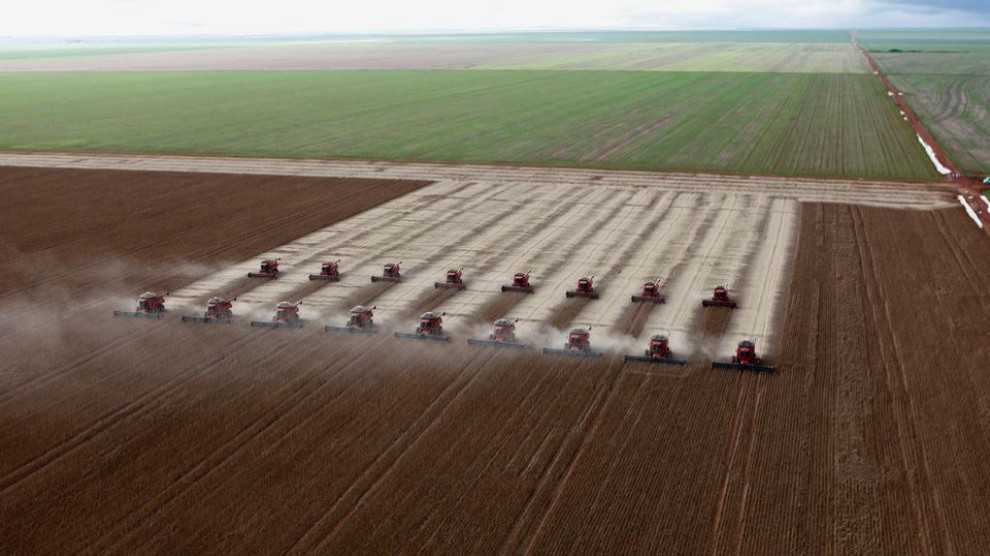Protests grow against EU-Mercosur deal
European farmers, environmentalists and many left parties have denounced the trade deal signed between the EU and South American countries as a "dark moment".
European farmers, environmentalists and many left parties have denounced the trade deal signed between the EU and South American countries as a "dark moment".

Critics of the European Union and South American trade bloc Mercosur warned that it will bring unfair competition.
Tough negotiations between the EU and the Mercosur countries - Argentina, Brazil, Paraguay and Uruguay - had repeatedly stalled because of European farmer sensitivities over the beef market.
Brussels said the EU's largest ever deal would save European companies more than four billion euros ($4.5 billion) in trade duties every year.
Yet documented and detailed criticism poured on the EU, from former association such as Copa-Cogeca union, which represents 23 million farmers across the EU.
"This deal will go down in history as a very dark moment," Copa-Cogeca secretary-general Pekka Pesonen tweeted.
Particularly strong was criticism in agricultural power houses like France and Germany.
The head of Germany's main farming union, Joachim Rukwied, called the deal "totally unbalanced", adding it would threaten the livelihoods of "many family-run agricultural businesses".
Christiane Lambert of France's biggest agricultural union FNSEA tweeted: "Unacceptable signature of a Mercosur-EU accord, which will expose European farmers to unfair competition and consumers to total deception."
French environmentalist and MEP Yannick Jadot said it was "shameful" of the European Commission to have signed a pact with Brazil's far-right and climate-sceptic leader Jair Bolsonaro.
Speaking on the sidelines of the G20 summit in Japan, French President Emmanuel Macron hailed a "good" deal, but said his government would remain "vigilant".
Protests in Ireland
Ireland's Agriculture Minister Michael Creed said he was "very disappointed" about quotas introduced "at a time when the beef sector in Europe is facing significant uncertainty because of Brexit".
The Irish Farmers' Association called the deal "a disgraceful and feeble sell-out".
Sinn Féin Louth TD Gerry Adams has warned that farmers in Louth face a “significant new threat to their livelihoods as a result of the new EU-Mercosur Trade Agreement”.
Gerry Adams described the international agreement between the EU and the four South American nations of Brazil, Argentina, Paraguay, and Uruguay as a “bad agreement for Louth, a bad deal for the island of Ireland, and a bad deal for our farming sector”.
Teachta Adams said: “The EU-Mercosur Trade Agreement will seriously damage an already struggling Irish beef industry and our rural communities. The farming and agri-food sectors, which already face enormous difficulties as a result of Brexit, will be put under even greater threat as a result of a deal which opens the EU up to cheap beef imports from South America."
Adams added: “Imports of beef from the Mercosur states will rise to almost 370,000 tonnes. Moreover, at a time when the EU and its member states have prioritised climate change, this deal will encourage states with a poor record of protecting their environments and a record of deforestation. Farming organisations have already expressed their concern that these states do not have the same standards of traceability, animal welfare, or food safety."
Adams said that the government must vote against this deal when it comes before the EU Trade Council. "Crucially, - he added - because the Irish government has no veto, and to pass the deal needs just 55% in a qualified majority vote, the government must urgently seek allies in an effort to block this treaty from coming into effect."
The agreement
The agreement covers markets that total some 780 million consumers representing a quarter of global GDP.
Once implemented, so the EU legend goes, it will eliminate 99 percent of agricultural and industrial tariffs on both sides and facilitate exchanges in services and government procurement, reduce technical barriers, and effect sanitary and phytosanitary measures and intellectual property.
However, one of the most contrversial point is that establishing that the EU will open its markets to South America agricultural products via quotas: 99 tonnes of beef per year at a preferential rate of 7.5 percent, a supplementary quota on 180,000 tonnes of sugar and another one on 100,000 tonnes of poultry.